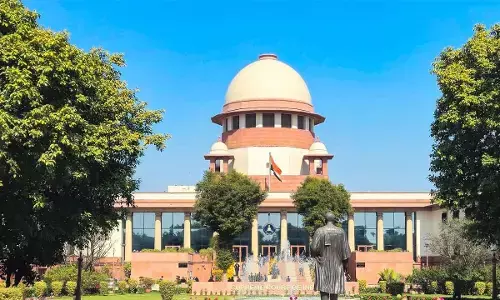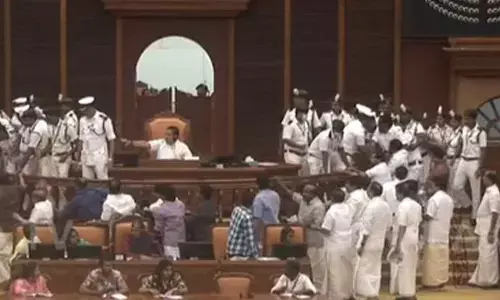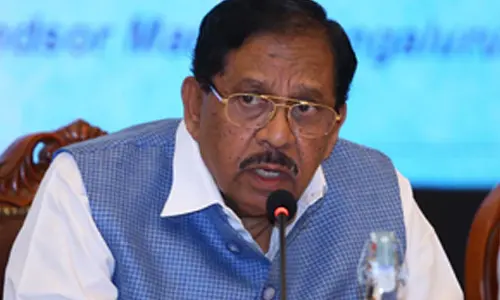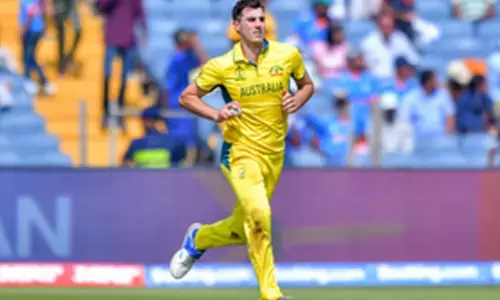MyVoice: Views of our readers 1st October 2023

MyVoice: Views of our readers 2nd February 2026
Mahatma Gandhi was not only a cricket enthusiast but he also wielded the willow.
A man of action… a dreamer of dreams
Long ago, in his illuminating article on Gandhiji, F Cyril James, Principal and Vice-Chancellor, McGill University, Canada, (1932-1962), said: “When Gandhiji returned to India, in 1915, it was Rabindranath Tagore, another great soul, who hailed him as Mahatma but the western world had not yet learned to appreciate his greatness or his powerful impact on the pattern of human society.... Lenin in a bitter blood-bath destroyed the empire of the Czars and established the Union of the Soviet Socialist Republics. Das Kapital has become a Bible to millions of people, although like the writings of other religions, it is more often quoted and argued about than understood: It has brought to the world not peace but a sword. Gandhiji, with no weapons and no material power exercised an influence that spread far beyond the Indian subcontinent. He said, ‘Resist with all your mind and spirit the things that are evil but never resort to violence; Worship Truth, love your fellow man.’ These are ancient precepts that men have heard and ignored. Gandhiji proved that they can change the face of the world.’’
In fact, there is not an area, be it economic, political, educational, religious or cultural which has not gained from his multi-faceted personality. Eminent writer like G Ramachandran hailed him as a saint and a revolutionary, a politician and a social reformer, an economist and a man of religion, an educationist and a Satyagrahi; devotee alike of faith and reason, Hindu and interreligious, nationalist, a man of action and a dreamer of dreams. Yet, the political parties and the successive governments in India put him in a niche, turned his message into a kind of cult, and his preachings into empty slogans.
Since the early days of his public career, Gandhiji subscribed to the principle of social justice. Though he did not style himself as a socialist, he laid stress on the principle of ‘’each according to his needs, from each according to his capacity.” He said, “Socialism is a beautiful word. In socialism, all the members of society are equal, none low none high...even as parts of the body are equal so are the members of society.” On the eve of a Sayagraha, he made a reference t to the vested interests in India, and said, “all those (vested interests) do not realise that they are living on the blood of the masses....Socialism begins with the first convert.” He felt that accumulation and preservation of wealth inevitably led to violence and called for ‘Trusteeship’ to avoid confiscation. Gandhiji was a staunch champion of the rights of women. He prophetically said, “In my opinion women should labour under no legal disability, not suffered by men.” Calling for a rational approach, he said emphatically, “The saying attributed to Manu that “for woman, there can be no freedom is not to be sacrosanct.....Expurgate All the texts that have no moral value or are contrary to the fundamentals of religion and morality...’’
He opined that nationalism, when distorted, was like a soporific blinding us to the higher vision of humanity. In 1925, he said, “We want freedom for our country but not at the expense or exploitation of others not so as to degrade other countries .For my own part, I do not want the freedom of India. If it means the extinction of England or the disappearance of Englishmen. My love, therefore, of nationalism is that if need be, the whole country may die, so that the human race may live.’’ A believer in Sarvadharma Samanatva, he was opposed to religious conversions. Gandhi was an intrepid champion of human dignity and respect for all beings. He placed the removal of untouchability above the goal of the attainment of Swaraj.. He said ‘’ Swaraj is a meaningless term if we desire to keep a fifth of India under perpetual subjection and deliberately deny them the fruits of national culture He evolved Satyagraha not simply as a thought system but as a practical philosophy of life, of action of self and God realisation.” A unique combination of two words, Satyagraha meant ‘’determined adherence to the truth of one’s perception and if opposed, readiness to suffer for it even unto death.’’ He held that good works must be performed in the spirit of sacrifice to the God of Humanity specially in serving ‘Daridranarayana,’ (God the poor and the down-trodden). Referring to the greatness of non-violence, he wrote as far back as in 1920, he said, “The Rishis who discovered the law of non-violence in the midst of violence were greater geniuses than Newton...They were themselves greater warriors than Wellington. Having themselves known the use of arms they realised their uselessness and taught a weary world that its salvation lay not through violence but through non-violence.”
It is said that one of the widely printed cartoons in America appearing immediately after the assassination of Martin Luther King Jr in 1968 showed King entering Heaven and meeting Gandhiji. The latter said; “The odd thing about assassins, Dr King, is that they think they have killed you.’’ True, great leaders who fight for justice to mankind do not die. They live forever in the hearts of succeeding generations and so are Gandhiji and Martin Luther King Jr.
–S M Kompella, Kakinada
‘Gandhiji was a dashing cricketer’
Mahatma Gandhi was not only a cricket enthusiast but he also wielded the willow. R G Mehta, a boyhood friend and schoolmate, wrote: "It is not commonly known that Gandhi was a dashing cricketer and evinced keen interest in the game. Once we were watching a cricket match together. In those days there were ding-dong battles between Rajkot city vs Rajkot Sardar (camp area). At a crucial moment, as if by intuition, Gandhi said that a particular player would be out and hey presto the batsman was really out. The freedom spirit of Gandhi came from the cricketing field.”
Requesting for his autograph Gandhi turned over the pages and put his signature as the 17th player of the MCC team led by Douglas Jardine in 1933-34. The autograph book is one of the treasured possessions of the Marylebone Cricket Club (MCC) at Lord's. Not only Gandhi signed an autograph book but also played for the team comprising Indians of British origin. Mahatma Gandhi played for a team of British origin against a team of Indian origin at London and scored 21 runs with 3 boundaries. He took one wicket also. He was wearing pants and a shirt while playing.
Cricket might not have affected Gandhi, but Gandhi certainly affected cricket. The political movements he led and the social changes he sought to bring about had their consequences on how the game was played in the sub-continent. Mahatma's classmate at Alfred High School, Rajkot, Ratilal Ghelabhai Mehta, remembered Gandhi as "a dashing cricketer" who "evinced a keen interest in the game as a school student. He was, it seems, good both at batting and bowling and had an uncanny understanding of the game's uncertainties as well. There is no doubt that the freedom spirit of Gandhi came from the cricketing field.
–C K Subramaniam, Mumbai
Lalbahadur Shastri, a model statesman
I visited the other day about 20 book shops in Koti, Hyderabad, for a book on Lalbahadur Shastri, our Second Prime Minister. Some people asked me who he was, while one elderly shop owner said clicking his tongue in disappointment, "Sir waste, nobody here knows anything about him and who reads books these days on such persons!" The shop keeper was right. Most of our youngsters don't have any knowledge about our leaders and Statesmen who are known for their principles, probity, selflessness, humility,and compassion, the most "essential seasonings" in moulding the personality and character of a person. Lalbahadur was one such leader and Statesman.
Born on 2 October 1904 in Mughalsarai now in UP, Lalbahadur was known at birth as Lalbahadur Verma. He was just 18 months old, when his father Sharada Prasad Verma, a teacher, died. His mother Ramdulari Devi, then just 23 and pregnant with her third child, moved to her parents' home and settled there for food. Unfortunately her father too died very soon and his brother took care of the big joint family. In other words, Lalbahadur was brought up with the benefits of a joint family.
As a student, Lalbahadur was meritorious. He used to go to school by swimming across the Ganges as he was too poor to pay for a ferry. In High School he was not only financially supported by one teacher Prasad Mishra but also inspired by his patriotic verve. He started reading the works of Vivekananda, Gandhi and Annie Besant. These works influenced him so much that he discontinued his 10th class studies, joined the Congress Party as a volunteer and plunged into the Freedom Struggle. In all, Lalbahadur spent three years in jail for his active role in the Movement. He got the title 'Shastri' after completing his graduation from Kashi Vidyapeeth in 1925.
Lalbahadur married Lalita Devi in 1928 and they had four sons and two daughters but they lost a daughter in 1940s as they couldn't afford to buy costly medicines for her treatment. After the Independence, Lalbahadur Shastri held many ministerial posts in the U P Government and later Nehru took him into his Cabinet. At the Centre also, Shastri held many Ministries including the Home and the Railways. In 1956 after a ghastly train accident near Mahabubnagar, he tendered his resignation, accepting his moral responsibility. Though Nehru didn't accept his resignation, another train accident in Tamil Nadu two months later made him press Nehru to accept the resignation.
With the sudden death of Nehru in 1964, Shastri stepped into his shoes as the Second PM and held the post with rare vision and unmatchable distinction. He had many achievements to his credit including his instrumental role in the White Revolution and the Green Revolution in India. His slogan, 'Jai Jawan, Jai Kishan' has made him immortal.
Shastri went to Tashkent in January 1966 to sign a peace treaty to end the second war between India and Pakistan. A day after signing the pact, Shastri died on 11th January in mysterious circumstances. Many rumours and theories about his demise were floated. After seeing the colour and condition of his body, the surgical marks on it, and the blood stains on his clothes, even Lalita Shastri got doubts about his death. Many books about this mystery have been written and, "Your Prime Minister Is Dead" by Anuji Dhar being the latest, published in 2019, and the movie, "The Tashkent Files" was also made in 2019.
Shastri not only shared his birthday with Gandhi but also he was one of the greatest disciples of the Mahathma. Like Gandhi, Shastri also led a simple and spartan life and like him, Shastri also left no property behind except an old car that was purchased on the never-never. In his 40 years of political life, Shastri remained above board, untouched by the tempting power and pelf of politics. He dropped the word, 'Srivastav' from his name and this act told the world that Shastri, like Gandhi, was secular to the hilt. The "Bharat Ratna" was awarded to him posthumously. Shastri was indeed a model statesman and the youth must emulate him because our present corrupt political system is in a 'crying' need of such leaders and Statesmen.
–M Somasekhar Prasad, Hyderabad
Remembering ‘Annadata’
The world has bid farewell to a visionary and global leader in agriculture with the passing of Dr M S Swaminathan. His contributions extended far beyond India, earning him international acclaim. His numerous awards and honors stand as a testament to the immense impact he had on food security and the promotion of sustainable agricultural practices. M S Swaminathan's pioneering approach transformed Indian agriculture, ensuring food security and inspiring future generations. The recognition of Dr Swaminathan's work and mentorship in agriculture, including by the Prime Minister, is heartening. His commitment to sustainable farming practices and research will continue to shape the future of agriculture, as seen through the UNESCO Chair and the ongoing efforts at the MS Swaminathan Research Foundation.
–Dr Krishna Kumar, Vepakomma, Hyderabad
Our nation has become self-reliant in our need for food, all thanks to Dr M S Swaminathan. He saved the country reeling under back to back famines, and from the condition of 'Ship to Mouth'. The sad demise of Green Revolutionist M S Swaminathan is a big shock for the nation. He championed the cause of bulk production of food grains to help India get rid out of hunger at a time when India was poverty stricken. The revolutionary agriculturalist championed the cause to make food surplus. He had changed the outlook of Indian pattern of farming and agriculture. He turned a global leader for making versatile improvement in agri techniques and fertilizers and pesticides use. The nation will never forget his tremendous contribution as an agricultural expert, Father of Green Revolution and plant geneticist. He will always stay alive in the hearts of the people.
–Kirti Wadhawan, Kanpur
M S Swaminathan was a rare scientist who walked ahead of his time. Moved by the flight of the people, and the country importing food grains under PL-480 from America during the 60s, he worked hard to tide over situation. With the mutation of Mexican and Japanese grains he developed high yielding varieties in wheat, rice, maize, pulses and Basmathi rice. He put his best efforts to take the available technology in agriculture sector from lab to land that facilitated revolution called green revolution. As a result of it, India turned self-sufficient in food grains from the position of importing. He strove hard to provide the country food security and economic growth with the development of agriculture.
–Pratapa Reddy Y, Tiruvuru, AP
The Father of Green Revolutionwho made India not only self-sufficient in paddy production but also made the country proud to feed many countries with his hybrid varieties of paddy with intensive research, MS Swaminathan should have got Bharat Ratna during his life time but unfortunately the governments which are proud of exporting rice to needful nations have lost touch of the Father of Green Revolution and forgot his worth for Bharat Ratna. But every farmer harvesting many new varieties of paddy increasing production beyond expectations resulting in export feels Swaminathan ever in their hearts as increased production made their lives comfortable and rich too with enhanced income. Swaminathan is a great and noble scientist. After refusing to join medical college and not accepting IPS job, he sacrificed his life for human welfare feeding their stomachs. Without confining his farm research to laboratories and awards, he transfered each and every good result of his research for increased production with quality paddy for human welfare. Even though he could not get Bharat Ratna, every single piece of paddy feels his soul ever with them more than any award.
–Jayaprakash Reddy, Nalgonda
This is regarding the editorial, and Talking About Many Things by Dr Mohan Kanda. Rich tributes were paid to Professor M S Swaminathan. The following excerpts describe the 'Great Soul' appropriately. Editorial aptly said, "Many state governments today take credit for improving the lives of farm communities by introducing certain measures. But they are all taken from various recommendations Dr Swaminathan had made over a period of time, but none will have the courage to say so." Dr Kanda wrote, "It is only rarely, in the history of the world, that people such as the Professor are born to contribute that leads to a quantum jump, in the pursuit of happiness by mankind." Dr Kanda called him 'Jagatguru.' 'Jagatguru' is the one who preached correct path but God is the one who feeds. Professor MS Swaminathan brought a metamorphosis in food production and created food for hungry millions. 'Annadana Priye' is one name for Sri Sabarimala Swami. Appropriate title for Professor is 'ANNADATA.'
–Gunturu Sivaramakrishna, Hyderaba
The passing away of M S Swaminathan, a geneticist and Father of Green Revolution in India in the sixties, drew the curtains down on the doyan of agriculture. It marks a sad day in the annals of history of India. However, in his illustrious career, agriculture productivity, taking leaps and bounds due to his push to use plant genetics that saw a boost in food production with growth yield, he averted food shortages. Fruits of his research not only transformed the lives of millions of farmers but also saved the lives of many more millions on the threshold of starvation. Added to this, it also saw a qualitative change for the better in the lives of farmers and the rural poor and tribals. Despite his foundation, MSSRF's focus is sustainable livelihoods, sustainable production and sustainable management of biodiversity. He championed the cause of women and tribals by encouraging women in agriculture, with the firm belief they would care for crops without harming the environment and increase the yield. It, indeed, has come true.
–K R Srinvasan, Secunderabad
The real tribute to the "Father of Indian Agriculture" MS Swaminathan is to apply his team's scientifically innovative methods (genetic engineering, mutation, hydrophonic etc.) to various pulses/grams to improve the yields. Grams have high nutrition value but cost of its various varieties is too high (ranging from double to 5 times that of rice's price). Apply the same to millets growth too. To make Swaminathan's soul completely happy, we need to finish the following works: 1) Implement (waterproof) godowns near fields/farms to save the harvest from sudden showers; 2) provide roofs (at least asbestos) to every market yard (as shelter from rains)' 3) Make transport of harvest, food grains economical via clean energy implementation (solar/wind/green hydrogen); 4) Make weighing of agricultural produce compulsorily digital so that farmers don't lose huge money due to false weighing. Then Swaminathan's soul will be very happy and so will be India, too.
–PV Rao Sreelekha, Secunderabad
Cleanliness shall be everyone’s duty
The effort to make the country clean, spick and span becomes a duty and necessity as dumping of waste at inappropriate place/s other than the assigned dustbins has become vogue. This is due to untimely lifting of wasteful garbage by civic bodies. In foreign countries, waste generated is disposed of as soon as it gets generated and dumped.
To take Gandhiji’s call and Modiji’s appeal forward, it becomes necessary that the entire process of generation, disposal, dumping and treatment of waste & its conversion into wealth become an exercise in every home. Creative ways to convert reusable waste into products of day-to-day use has been encouraged by Modiji thru his many monthly broadcasts of ‘Mann Ki Baat.‘ As not everybody is blessed with skills of creativity, one can at least contribute his or her small mite by wholeheartedly joining the movement for cleaning our nearby Mohallahs, streets and our immediate neighborhood.
–N R Raghuram Hyderabad














